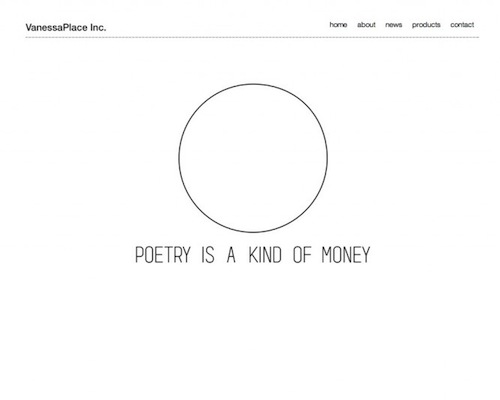This is the fifth part of a five-part paper, a version of which was given April 26, 2013 as the keynote address at the symposium, "Lament of the Makers: Conceptualism and Poetic Freedom," hosted by the Princeton Graduate Colloquium on Contemporary Poetry. Other symposium participants were Timothy Donnelly, Jena Osman, and Kent Johnson. Monica de la Torre was the featured poet. Parts 1-5 may be found here.

All fine and good and true enough for ordinary inquiries and poetic ventriloquisms, but what conceptualism does differently is block the exchange of capital by that transference. I have no proprietary right, no more than you, to explicate language I’ve scooped off the sidewalk.
Remember Hegel identified property as essential to subjectivity because property enables the assertion of will by proxy and its capacity for alienation. The lyric poet owns the subjectivity encapsulated in the lyric. The lyric poet also owns the ancillary rights to its derivative works.Whether this leads to recompense by way of an honorarium or anthology, is irrelevant, because under semiocapitalism, the signature move is not the poem as the point, but the poem as the platform. What the non-conceptual author owns is not the poem as such, but the capacity, the license, to trade in the semiotic market.
You poets are in this sense the hedge fund managers of semiocapitalism—you have a stake in it. And your stake is made most manifest by your taste.
For the danger is not the institution. After all, where would we be but for the institution? Not here, certainly. The danger is one’s own taste.
Taste in this sense being both the flavor of one’s preferences and of one’s essence; taste, like the mirror, reflects and projects. For taste is the flavor of ideology: as Wittgenstein said, “Taste makes ACCEPTABLE.”[1] Lack of taste, therefore, makes unacceptable. Thus, my Statement of Facts may be called a-political while a rather dumb rape joke[2] is immediately understood as terribly political. This is because one remains in the realm of the real, i.e, taste-less, while the other is received or perceived as already processed, i.e., tasteless.
Put another way, it is the essential myth of the lyric is that the higher the art, the more one may capture that which is not art, that thing that lies beyond language. The problem, as Derrida noted, is there is nothing beyond language. To paraphrase Wittgenstein: What we cannot pass over in silence, we must speak about. “About” in the sense of a spatial-temporal engagement—in other words, the negative space of the ideological tastes of our time and place. Earlier, I surveyed the law of copyright by way of underscoring the essential function of the authorial “I” most institutionally inscribed by the lyric poet.
It has become apparent to me that poetry is fundamental to capital, just as the humanities are desperately needed, though there is an obfuscation of the need through a stupid insistence on functionality. What is poetry/art for, etc., and while there is an easy answer about the utility of critique and interrogation, for plodding logic and pedantic insistency that science rewards less often than the humanities, there is a better, more transcendental, more obvious, response.
Again, Wittgenstein: “The aspects of things that are most important for us are hidden because of their simplicity and familiarity. (One is unable to notice something—because it is always before one’s eyes.) The real foundations of their inquiry do not strike people at all. Unless that fact has at some time struck them.—And this means: we fail to be struck by what, once seen, is most striking and most powerful.”[3]
This is the freedom promised by poetry.
Poetry is the key to the legitimacy of all our other strivings. Because poetry makes us less puny. Even our object-oriented ontologies have to start somewhere, and that somewhere is the largesseness of us—of each of our Is, blinking in unison.
In a recent interview, Kim Kardashian: “If I look at the message I’m portraying, I think it definitely is be who you are, but be your best you.” “I mean, acting and singing aren’t the only ways to be talented. It’s a skill to get people to really like you for you.”
And this is money in the bank.
It is time for me to finish, to allow for the excitement to follow. To quote Swift: “ev’ry Poet in his Kind, is bit by him that comes behind.”
Thus, Andrea Fraser is now an art production of the Whitney Museum, and Kenneth Goldsmith a part of poetry history—witness his elegant performance at the White House, where it became immediately and institutionally true that there is this line from Whitman to Crane to Goldsmith—and Bin Laden is now a video artist, and I, your guest. And we must ask ourselves, again, so where do I sign up?
And again, to answer, you already have.
Poetry is what poetry is, and what poetry is has everything to do with the packaging of the imaginary libratory subject. It has to do with other soft-eyed dreams—that clouds mean, that representations are, that language matters, that at any moment there can be a pivot-point at which a terrible beauty may be born. Beauty, it could be noted, being the beast that is absolutely indifferent to the corpse before it. And that these things are as true as anything else. Or, more precisely, as tragically true as everything else.
The poetic subject is us, here, now, the point at which the false may be beautifully, horribly, real.
Or, to misquote Eric Hoffer, “Every great cause begins as a movement, becomes a business, and eventually degenerates into a racket.”
Put another way, “I” is not a subject.
I is a racket.[4]
I thank you for your kind attention.
[1] Ludwig Wittgenstein. Culture and Value. (Malden, MA: Blackwell,1998), 68e. Preceded with the note: “Taste rectifies, it doesn’t give birth.”
[2] American comedian Daniel Tosh, responding to a female audience member who heckled him about his earlier comments to the effect that the idea rape jokes cannot be funny is itself funny, said, “Would isn’t it be funny if that girl got raped by, like five guys right now? Like right now?” This is not to say that rape jokes cannot be funny, just as there are funny genocide jokes. They may not be fun, but they are funny, yes? Cruelty is always funny if looked at from the point of view of a duck. Or, to quote Didier Grumbach, President of the Fédération Française de la Couture, "Paris est clairement la capitale de la creation."
[3] Proposition #129. Ludwig Wittgenstein. Philosophical Investigations. Eds. P.M.S. Hacker and Joachim Schulte. Trans. G.E.M. Amscombe, P.M.S. Hacker and Joachim Schulte. 4th ed. (West Sussex, UK: John Wiley and Sons, 2010), 56e
[4] I should also note that this talk will be presented in 5 installments on the Poetry Foundation’s blog Harriet, which is paying me $80 a post for my participation as a guest blogger during National Poetry Month. This, I believe, also proves my point.
Poet and criminal defense attorney Vanessa Place earned a BA at the University of Massachusetts at Amherst...
Read Full Biography


